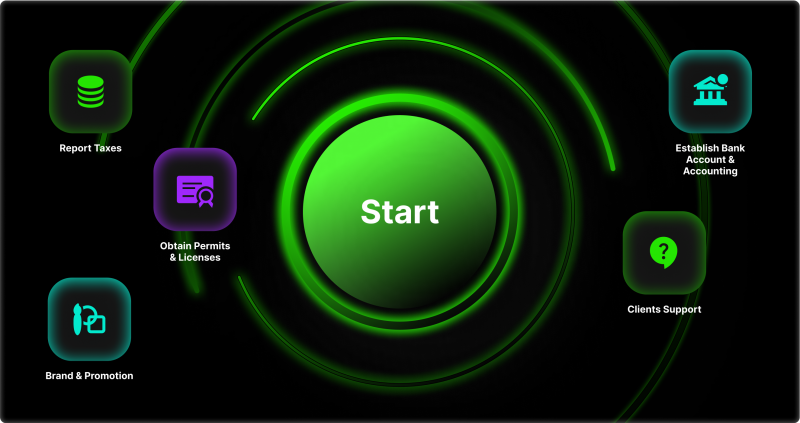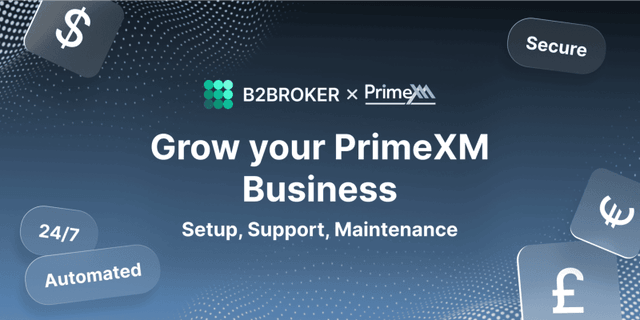How to Start a Securities Broker in 8 Easy Steps

Many entrepreneurs are currently looking for ways to set up securities brokers. Presently, multiple methods exist to accomplish this goal. You can choose to either start from scratch or use pre-made solutions, which significantly make the whole process easier.
Starting your own business has numerous advantages, but you should also understand the difficulties. Developing a new broker involves a lot of work, time, patience, and money. But, once you have control over the firm, it could eventually become a lifetime success.
In this article, you will find out what types of securities there are, how securities brokers work, the advantages of owning a securities brokerage business, and step-by-step advice on building a profitable project.
First, let’s begin with the definition of security.
What are Securities?
A financial instrument that is fungible, negotiable, and has some monetary worth is referred to as a “security.” Security can reflect rights to ownership through an option, a creditor relationship with a governmental organization or company through the ownership of that entity’s bond, or ownership of stock in a firm.
Let’s first look at a brief history to understand how the concept of “securities” came up with what we know today. The U.S. stock market was historically run at the state level until the Securities Act of 1933. According to the law, anyone who wants to offer investment contracts for sale to the general public must disclose specific details about the intended offering.
Thanks to this law, the investing public is prevented from dishonest or false marketing tactics. Any misrepresentation in the company’s financial accounts is the responsibility of the company and its top executives, whether intentional or not. The Securities and Exchange Commission (SEC) is an institution you will almost certainly come across while working with securities. They are in charge of all existing rules and enforcement, which are continuously updated by the latest legislations.
Whereas stocks, bonds, and other comparable financial instruments are frequently included in discussions of “securities,” the U.S. Supreme Court assigns the term a much broader meaning. Although there was no sign of a stock or bond, the court determined in the popular case of Howey v. SEC (1946) that the complainant’s selling of land and farming services constituted an “investment contract.”
As an outcome of this controversy, the four-part Howey Test was developed. It states that an investment meets the criteria for being security if:
A) There has been a financial investment.
B) The funding comes from a “shared enterprise.”
C) The stakeholders predict that their investment will make them more money.
D) Any anticipated gains or returns are linked to the operator or acts of a third party.
The rule states that any investment proposal can be a security, regardless of whether a written contract or stock certificate formats it. The SEC has even sought enforcement actions against companies that issue non-fungible tokens (NFTs) or cryptocurrencies.
What Are The Types of Securities?

Generally speaking, securities fall into two main categories: equity and debt.
Equity Securities
Equity security is a share of capital stock, consisting of preferred and common stock, that symbolizes shareholders’ ownership stake in a legal body (such as a corporation or association).
Although equity securities frequently pay out dividends, holders of these assets usually are not entitled to monthly payments; instead, if the value of the shares has improved, they can collect profits from selling them.
By way of the right to vote, equity securities give the purchaser a proportional share of the control of a company. They may be provided as a form of “payment-in-kind.” If bankruptcy appears, they only participate in the interest that remains after all obligations to creditors have been satisfied.
Debt Securities
This kind of security represents borrowed funds that must be reimbursed, with terms defining the amount borrowed, the interest rate, and the expiration or renewal date.
They typically oblige their issuer to the consistent payment of interest, principal repayment (irrespective of the issuer’s results), and other specified contract rights. Debt securities include state and commercial bonds, deposit certificates, and collateralized securities.
They are typically granted for a set period of time, after which the issuer may reclaim them. In the case of bankruptcy, debt securities may be legally prioritized over other unsecured debt securities.
Have a Question About Your Brokerage Setup?
Our team is here to guide you — whether you're starting out or expanding.
Combined (Hybrid) Securities
Such securities contain aspects of both debt and equity securities. Examples of hybrid securities are equity warrants, convertible bonds, and preference shares.
How do Securities Businesses Work?
Investors trust big securities companies and brokerages with their capital, with hundreds of employees frequently working for these enterprises. Thanks to regulations, clients can feel confident that their investments are managed by a qualified team of experts when dealing with renowned organizations.
What is the process?
Every serious brokerage business should involve:
- Sales
- Underwriting and Financing
- Trading
- Research and Portfolio Management
- Administration
Let’s take a closer look at each one of them to understand how a securities broker works.
Sales Department
The sales department typically has the largest workforce since it is where investors frequently communicate. Advisors offering professional investment may concentrate on serving a specific part of the investment sector within the retail sales staff. Occasionally, they might act as a “one-stop-shop” for all client requirements relating to retail investing.
The institutional sales division frequently contributes significantly to the company’s earnings. The high dollar amount of transactions and the commissions from new and existing clients are highly advantageous for institutional sales.
Finances and Underwriting
Every securities brokerage should have an underwriting or finance division. The secondary market’s initial and subsequent securities issuance are coordinated by this division. The underwriting or finance department negotiates with the businesses or authorities issuing the securities. They define the type of security, its cost, an interest rate as necessary, and other unique characteristics and safety precautions.
Trading Processes
The company’s trading business is usually divided into multiple departments that trade various assets. The trading of bonds, equities, or other specialized financial instruments may be the main focus of these departments. They might also concentrate on treasury securities, municipal obligations, etc.
The securities brokerage trading business may also be divided into sections focused on various special instruments. Depending on the company, they may have sections for mutual funds, exchange-traded funds, options, commodities, or futures contracts.
Management of the research
Having a research department is vital. The company’s securities analysts should deliver traders the necessary analysis and data. This information depends on the price and sale of new and existing securities. Hiring economists and technical and research analysts will certainly be helpful for the company as a whole.
Administration
The company’s structure must include the administration department because it keeps and maintains records of all transactions. More significantly, it manages internal HR and ensures laws are obeyed. Wages, budget, accounting documents, and other reports are all within the financial division’s control.
The administration is also vital for the business since they check the flow of maintained balance of all incoming and departing funds. Dividend payments must be deposited to accounts when received, and securities must be examined for registrations and other criteria.
Now, let’s look at the advantages of starting a brokerage business.
Advantages Of Brokerage Business

For many, having the ability to help others as a finance broker provides tremendous professional satisfaction. But it goes beyond that.
So what are the benefits of starting a brokerage business?
1) Freedom – Brokers have the chance to operate on their terms and grow their businesses in a way that reflects their personal preferences. You have a unique opportunity to build a reputation as a reliable broker and attract new clients.
2) Flexibility – People find this solution appealing because once a clientele has been built, they can work on their own schedule. Being an entrepreneur allows you to organize your professional life according to your convenience, which is extremely valuable.
3) Regulation of the Workplace – Many find this a bad factor, but most of the market’s aspects wouldn’t go as smoothly without regulations. The industry has undergone more regulation in the past few years, creating a welcoming atmosphere for individuals first entering the field.
4) Deliver The Best Possible Service – You can provide high-quality services to your customers as a broker and simultaneously enjoy what you do. You are in an advantageous position to create a specific solution for your client, unlike a finance manager who can only provide what is supported by a particular business he works for.
5) Potential Of Attractive Profits – Brokerages who are serious about making money strive to set themselves apart from their competitors. It is widely known that every excellent securities broker has the potential to earn a very nice living. If you are successful in beating your competition, you’ll be able to enjoy benefits at the elite level.
Now that it is clear what the main benefits are, let’s look at how to start a brokerage business.
How To Start Your Own Securities Broker

Below are eight main steps you should follow to become a successful legal brokerage business.
1) Planning – Begin with a plan of your company’s specifics. Think about a question such as:
A) What will be the initial capital?
B) What audience do you want to reach?
C) How much will you be charging your clients?
Think thoroughly and remember that starting a brokerage business will not be a cheap endeavor.
2) Make It A Legal Entity – Your business should be registered as a limited liability company (LLC), corporation, or sole proprietorship to become a legal business structure. By forming a legitimate business entity, you can avoid being held personally accountable if your securities brokerage company is sued.
3) Report Taxes – Before starting a brokerage business, you must apply for federal taxes, which vary in every jurisdiction.
Your options for how your firm will be taxed may vary based on the business form you select.
4) Establish Bank Account & Accounting – The use of exceptional business banking and credit accounts is crucial to protecting your personal assets. The separation of your personal finances from those of your business is essential. Therefore, open a corporate bank account, which will make it easier for budgeting and tax filing. Understanding your business’s financial performance depends on keeping track of your expenses and revenue sources. Maintaining precise and thorough records also makes filing your yearly taxes much simpler.
5) Obtain Permits & Licenses – Stiff penalties or suspension of your business may come from failing to obtain the required permissions and licenses. Business license requirements from the government should never be ignored. For that, check all the conditions set forth by authorities.
6) Get Insurance – Insurance is also necessary for the company to function correctly. The financial stability of your business is guaranteed by insurance in the case of a harmful event.
Discover the Tools That Power 500+ Brokerages
Explore our complete ecosystem — from liquidity to CRM to trading infrastructure.
There are many insurance policy categories for various business models with multiple risks. Firstly, start with general liability insurance. For your business, it’s a great place to start since it’s the type of insurance that is most needed.
Secondly, it would be great to obtain workers’ compensation insurance, which is considered a significant insurance program that many businesses require.
7) Brand & Promotion – Your firm’s brand is what you represent to the public. Your company will differentiate from the competition with a robust brand name. Promoting buying and selling on your trading platform through marketing is crucial.
Your chances of succeeding will increase if you use a variety of advertising strategies, such as videos, social media marketing, and so forth.
8) Clients Support – Outstanding customer service helps to promptly handle any issues or inquiries from clients. How well you treat your consumers will determine whether your business succeeds or fails.
White Label Solution
It isn’t easy to start a business from scratch. But luckily, there is good news. White label software was designed to help ambitious people like you.
A white label exchange is a thoroughly prepared platform that can be modified and released to the market under a different logo.
WL is a readymade solution for anyone keen to launch a new brokerage business. A robust matching engine, user interface, multiple assets, APIs, and other capabilities are just a few features such a solution includes.
Once you decide to employ WL, all you have to do to start your platform is promote it with your brand.
Conclusion
Securities brokerages are still relatively mysterious to ordinary clients while remaining crucial to the financial markets. Securities firms maintain a relatively discrete atmosphere due to the specific roles and professions of their participants.
Because of that, many individual investors solely communicate with their financial advisors. Additionally, it is becoming more typical for self-directed investors to use the trading platform of a brokerage company without communicating with any staff members. As a result, most people lack the understanding of the full range of roles within securities businesses.
Perhaps you can try and bring a unique project that will change the stereotype. Think of bringing something special to the industry.
Remember, when it comes to building your own business, it certainly will not be a simple task. You can start by yourself from scratch or find solutions that will work best for you, such as a white label solution. Do proper research, collect enough capital, follow your plan, and prepare for a long but definitely exciting journey.






